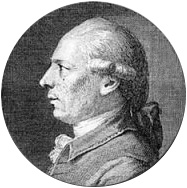Philidor, Sinfonia 1 in G Minor
 François-André Danican Philidor (1726-1795) came from a family with a prominent place in French Baroque music during the 17th and 18th centuries.
François-André Danican Philidor (1726-1795) came from a family with a prominent place in French Baroque music during the 17th and 18th centuries.
The oboist Michel Danican (c. 1600-1659) so impressed Louis XIII that he dubbed him “Philidor” as a comparison to the famed Italian oboist Filidori, or so the story goes. Jean Danican (c. 1620-1679), also an oboist and either the son or younger brother of Michel, began using the name officially from about 1659 on. The name was then passed down to succeeding generations of Danicans.
Jean’s son André (c. 1652-1730) served as the King Louis XIV’s librarian and is known for organizing the Philidor Collection comprised of much of the music performed at Versailles. André was also a composer, oboist, and drummer. He sired 16 children by his first wife and another 5 by his second. The youngest son, François-André, composed our featured work.
François-André received his musical education from André Campra, the maître de chapelle at Versailles, and had a motet performed at the chapel in 1738. He made a concert tour to the Netherlands in 1745 and went from there to England where he would maintain strong ties throughout his life. When he returned to France in 1754 to seek the position of court composer at Versailles, his music was deemed too Italian. That was no impediment, however, to working with opéra comique, and François-André found considerable success in that genre, especially with his opera Tom Jones based on the Fielding novel.
His one instrumental work, composed before he turned to opéra comique, is the set of quartets named L’art de la modulation.
But he is better known not as a musician, but as a chess master and as the namesake of the “Philidor defense.” He developed his chess skills in his early years in Paris where he once played against Benjamin Franklin. He published his famous Analyse du jeu des Échecs in 1749. Acknowledged as the best chess player of his day, he would entertain his friends by playing multiple games simultaneously and blindfolded.
Because of his ties to Royal service, Philidor left France at the beginning of the French Revolution and died in England.



